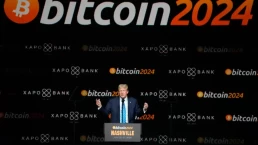The crypto industry uses vast sums of money to create majorities in Congress to champion their unpopular cause.
By Tom Williams, Current Affairs
The last few years have been disastrous for the cryptocurrency industry—at least in terms of public reputation. A little over 15 years after bitcoin’s emergence promised to transform the global economy around the values of greater privacy and financial freedom, a series of high-profile scandals have seen trust in cryptocurrency plummet to staggering lows.
The decentralized currency has been characterized by sharp, sudden rises and falls in value—as seen in the profitable “bull run” of 2017 and the “crypto winter” that followed in early 2018—leaving many traders facing staggering losses. More recently, a series of high-profile court cases against industry leaders who cheated traders out of millions and billions of dollars highlighted the risks associated with investing in this under-regulated sector.
This all came to a head with the downfall of FTX cryptocurrency exchange founder Sam Bankman-Fried, who was sentenced to 25 years in prison in March 2024 for defrauding customers and investors alike. In the wake of the revelation that one of the industry’s leading figures had taken billions from customers in order to buy property and make political donations (among other unauthorized uses), crypto’s remaining power figures began looking for a way to rebuild as their reputation lay in tatters.

Their calculation? That if they couldn’t win the trust of the public at large, they would use their millions to create a supportive majority in Congress. Three crypto-backed super PACS—innocuously named Defend American Jobs, Fairshake, and Protect Progress—spent more than $265 million in the 2024 election cycle trying to oust crypto skeptics in favor of candidates who had signaled a willingness to ease regulations on the currency.
Even before November, the PACs had racked up a number of big wins. Fairshake spent $10 million boosting Adam Schiff (who received an A-rating from the crypto industry) in the Senate primary over Katie Porter, a progressive known for taking tough stances against corporate greed. Schiff went on to convincingly beat Porter in the March primary and won the general election in November. Similarly, the group spent more than $2 million opposing New York representative and fellow progressive Jamaal Bowman. Bowman, who faced well-funded opponents from both the crypto and pro-Israel lobby, was defeated in what became the most expensive House primary race ever.
In the 14 years since the Citizens United ruling opened the floodgates for big money to gain unprecedented power in U.S. politics, donations from cryptocurrency groups have constituted 15 percent of corporate political contributions. The industry’s spending—which totals $129 million since 2010—puts it second only to the fossil fuel industry.
Recent Posts
New Addition to List of Nuclear Near Catastrophes
February 25, 2026
Take Action Now Debris flew for great distances — many times the distance of 270 meters to a nuclear reactor and nuclear storage facility.By David…
Gavin Newsom’s last budget belies his ‘California for All’ pledge
February 24, 2026
Take Action Now Yet, even as the state is poised to lose billions in federal funding, and millions of Californians are losing access to health care…
Israel and American Hawks are Pushing U.S. to Iran War With Catastrophic Consequences
February 23, 2026
Take Action Now At the World Health Assembly in May, member states may endorse an unprecedented strategy declaring that health is not a cost – but…
A Child’s View of the Attack on Venezuela. And a Peace Flotilla
February 23, 2026
Take Action Now Fabricio said that he and his family went out of their building and saw many people also going outside, running around, and kids…




